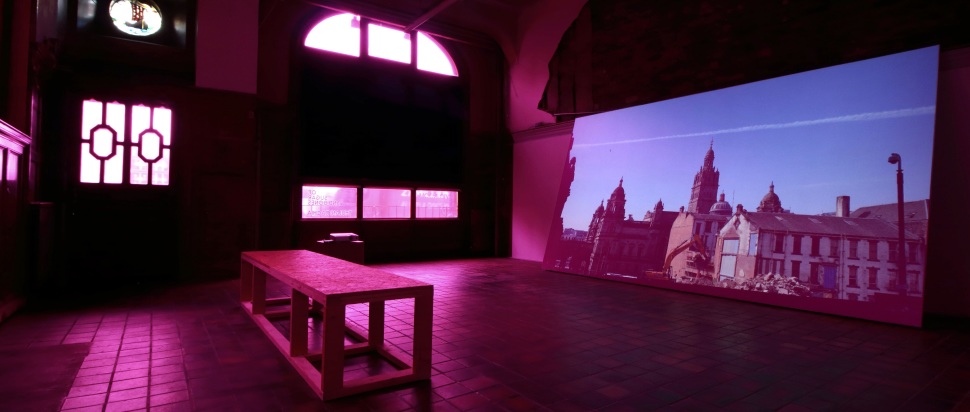Thulani Rachia @ Civic Room
Thulani Rachia draws attention to Glasgow's historical architecture, the common sight of its demolition, and the political implications of wiping out without reparation the traces of the city's role in the slave trade
Civic Room's windows have been recoloured, casting a pink-purple light throughout the gallery, and a large screen shows a silent film of a demolition process. Without the noise of construction, the crane is transmogrified. It becomes a stiff and careful arm, then something like a dinosaur or monster gnashing up bricks. Its movements are unexpectedly captivating, despite being a common sight around the city.
On an adjacent screen, questions are displayed in Zulu while English shows on the larger screen: “What do you remember?/Ukhumbhulani?” “Do you remember the songs of your bones?” “How do we excavate the dreams laid to rest in these walls?” The background colour is the purple-pink of the windows, and of the 'People Make Glasgow' branding seen throughout the film.
At points, the Glasgow City Chambers is the carefully-framed backdrop of the swinging crane, an example and symbol of the profits of colonialism and slavery. Leaning against the wall, the screens implicate the gallery building, a former colonial linen bank.
Demolition continues, a fence is put up, then a net, and finally a thick black wall. The spokes and weave of the net are mesmerising visual layers, before the the wall bisects the screen in an abstract, dramatically-composed shot. Finally, Rachia as the cameraperson passes through the City Chambers’ resplendent interiors. The final shot is the construction site seen from above, directly across the road from the Chambers.
Along with the demolition, fencing and partitioning become politically-charged actions of obscuring and erasure as the film installation draws attention to the significance of colonial architectures within collective memory, and the memories and “dreams” they hold. Demolition and city planning that often goes unnoticed in the urban environment is carefully witnessed by Rachia as an insidious process of wiping out, without reparation, the traces of Glasgow’s role in the slave trade.
